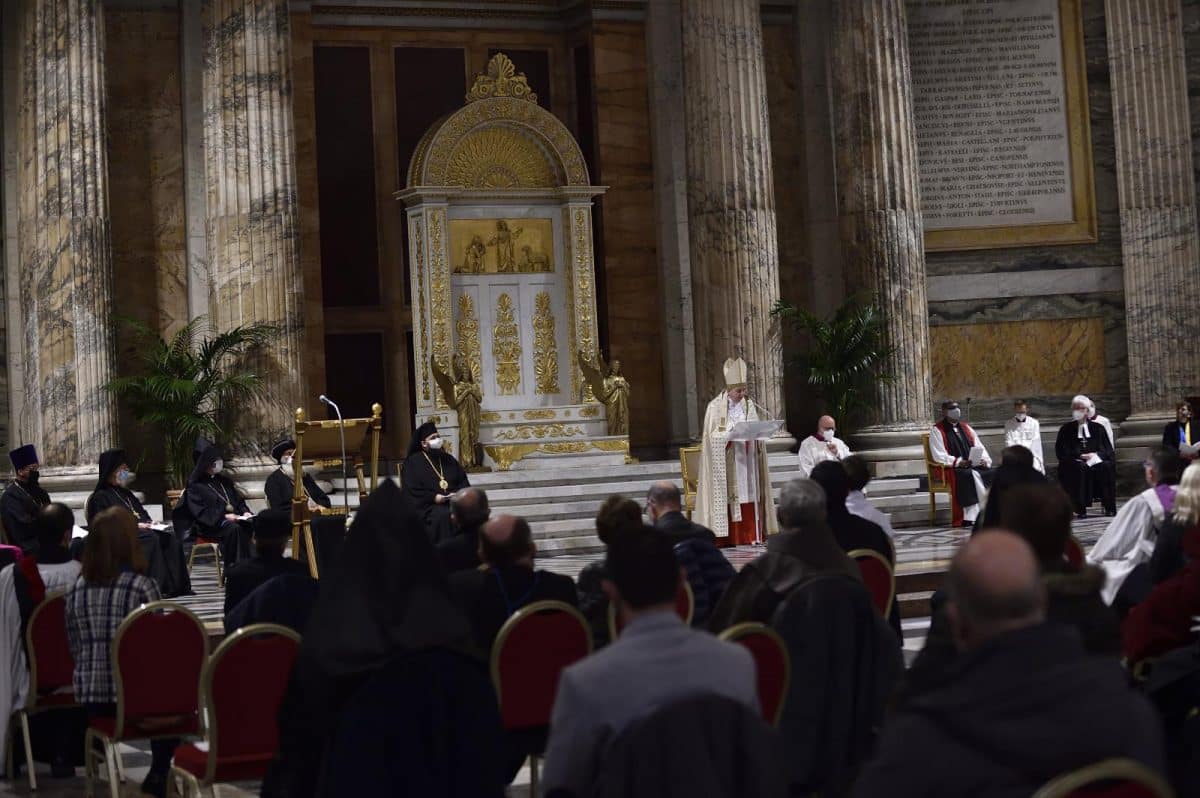
ROME (CNS): “Each community has a gift to offer to the others,” Pope Francis wrote for the prayer service on January 25 at the end of the Week of Prayer for Christian Unity at Rome’s Basilica of St. Paul Outside the Walls.
While a flare-up of sciatica, a painful nerve condition, prevented the pope from presiding over the ecumenical vespers, his homily for the service was read by Kurt Cardinal Koch, president of the Pontifical Council for Promoting Christian Unity.
“The more we look beyond partisan interests and overcome the legacies of the past in the desire to move forward toward a common landing place, the more readily we will recognise, welcome and share these gifts,” the pope wrote in his homily for the evening prayer.
The service began with Cardinal Koch, Orthodox Metropolitan Gennadios of Italy, and Anglican Archbishop Ian Ernest, director of the Anglican Centre in Rome, praying at the tomb of St. Paul and venerating the relics of the apostle’s friend and co-worker, St. Timothy.
Because of Covid-19 coronavirus (SARS-CoV-2) precautions, only invited guests—Catholic, Orthodox, Oriental Orthodox, Anglican, Lutheran, Methodist, Waldensian, Salvation Army and other Christian representatives—were able to gather for the prayer at the basilica.
In his letters to Timothy, which are part of the New Testament, St. Paul calls the younger evangeliser his “child in faith.” His relics were brought to Rome from Termoli, in southern Italy, for the week of prayer.

The theme of the 2020 week, They Showed Us Unusual Kindness, was drawn from the account in the Acts of the Apostles of St. Paul being shipwrecked in Malta.
Although, as a prisoner, “he was among the most vulnerable” onboard, Pope Francis wrote that Paul offered words of hope to the others and advice based on his trust in God that none of them would lose their lives in the storm.
“This account from the Acts of the Apostles also speaks to our ecumenical journey toward that unity which God ardently desires,” Pope Francis said, noting, “it tells us that those who are weak and vulnerable, those who have little to offer materially but find their wealth in God, can present valuable messages for the good of all.”
The pope said, “Even the smallest and least significant” Christian communities in the eyes of the world, “if they experience the Holy Spirit, if they are animated by love for God and neighbour, have a message to offer to the whole Christian family” that is especially true of “marginalised and persecuted Christian communities.”
The biblical account also shows God’s desire to save everyone, the pope said, which is why Christian Churches and communities must not focus exclusively on internal matters, but “open ourselves to the good of all, to the universal gaze of God who took flesh in order to embrace the whole human race and who died and rose for the salvation of all.”
“From this Week of Prayer, we want to learn to be more hospitable, in the first place among ourselves as Christians and among our brothers and sisters of different confessions”
Pope Francis
The account of the shipwreck ends with praise for the hospitality the people and governor of Malta showed to St. Paul and the rest of their unexpected guests.
“From this Week of Prayer, we want to learn to be more hospitable, in the first place among ourselves as Christians and among our brothers and sisters of different confessions,” the pope said.
Each Christian, Pope Francis wrote, is called to maintain and strengthen his or her adherence to God, his or her place on the vine, through prayer.
“In today’s fast-paced and complex world, it is easy to lose our compass, pulled as we are from every side,” he said, but “Jesus tells us that the secret of stability is to abide in him.”
The pope wrote: “To the extent that we abide in God, we draw close to others, and to the extent that we draw close to others, we abide in God,” adding, “Prayer unfailingly leads to love; otherwise, it is empty ritual. It is not possible to encounter Jesus apart from his body, made up of many members, as many as are the baptised.”
Pope Francis wrote that, like the branches that Jesus said would need to be pruned sometimes, each Christian will have defects or shortcomings that will need to be pruned away, he said.
“Let us ask the Father, then, to prune our prejudices with regard to others, and the worldly attachments that stand in the way of full unity with all his children. Thus purified in love, we will be able to be less concerned about the worldly obstacles and stumbling stones from the past, which nowadays distract us from the gospel.”
The pope noted that while unity among Christians is essential, it is not enough. God “impels us to love not only those who love us and think as we do, but to love everyone, even as Jesus taught us.”
Strengthened in unity, the pope said, Christians will work together to love all their neighbours and to be “good Samaritans to a humanity that is frail, poor and, in our own time, suffering so greatly.”
Pope Francis wrote, “A tree is known by its fruits. By our gratuitous love it will be known if we are part of the vine of Jesus.”








